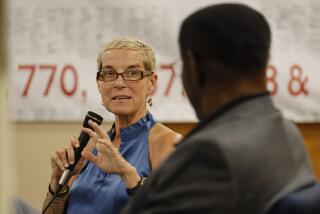Benjamin Aaron, 91; UCLA law professor mediated labor disputes
Benjamin Aaron, a prominent legal scholar and UCLA professor known for mediating labor disputes in major industries across the country, including settling the massive 1970 teachers strike in Los Angeles, has died. He was 91.
Aaron, who also was the longest-serving director of UCLA’s labor research institute, died Saturday at UCLA Medical Center from a brain hemorrhage suffered after a fall, his family said.
“He was a giant in the fields of labor law and industrial relations,” said John Trumpbour, research director for Harvard Law School’s labor and work-life program, “and he had a key role in Los Angeles labor history.”
After a strike by about 14,000 teachers crippled the Los Angeles Unified School District in 1970, Aaron brokered the settlement that ended the nearly five-week walkout. It had become the longest teachers strike in the history of California public education.
He also helped settle many labor disputes that plagued the state’s aircraft companies after World War II, and he played a major role in mediating farm labor disagreements that often involved Cesar Chavez.
Nationally, Aaron arbitrated labor agreements in most major industries, according to his family.
Five presidents -- Harry Truman, Dwight D. Eisenhower, John F. Kennedy, Lyndon B. Johnson and George H.W. Bush -- appointed him to national boards and commissions.
One national panel he served on in the mid-1960s tried to deal with fears that technology would increase unemployment.
“It was one of the earlier efforts to address the great pace of technological change and how it affects the world of work,” Trumpbour said.
When Aaron joined UCLA’s year-old Institute of Industrial Relations in 1946, California was experiencing unprecedented prosperity amid a post-war boom in such industries as aerospace, shipping and construction.
Daniel Mitchell, who directed the UCLA institute from 1979 to 1990, said Aaron “came to UCLA when the whole issue of labor relations and management was very much a major public issue, and he was at the center of the public discourse.”
Aaron arrived after spending four years on staff and serving as exec- utive director of the National War Labor Board, which handled thousands of labor disputes during World War II.
From the beginning, the UCLA institute recognized that its work was inextricably linked to many of society’s larger issues, Aaron said last year in a UCLA Today Online story marking the institute’s 60th anniversary. He was its director from 1960 to 1975.
In recent years, the institute has helped shape public policy through research on such topics as job growth, labor law enforcement, union membership and work-family policies in the state, according to UCLA.
“Ben Aaron played such a big role in building up the institute,” Trumpbour said, “and knew how to build up alliances to keep it going.
“He was aware that some people did not like universities to have labor programs, but he thought labor issues should be an important component of university life.”
His genteel manner made him well-suited to the task, colleagues said.
Last week, Aaron was quoted in a Times story on political attacks on the University of California’s labor programs in the context of deliberations over the state budget.
Aaron recalled that in the 1940s and ‘50s, he had spent much time defending the institute against charges that it advanced communist causes.
“I’m not surprised,” Aaron had said of the current attacks. “I’m depressed.”
Internationally, Aaron also became known as a major figure in the field of comparative labor law, which examines how countries around the world deal with labor relations.
“He made the academic world and the larger world aware of the fact that there was more than one solution, which was a major contribution,” Mitchell said.
Since 1960, Aaron had been a professor at UCLA’s law school and remained an engaged professor emeritus since 1986.
Dressed nattily, and always wearing a tie, he continued working at UCLA until shortly before his death.
“Ben was a scholar of enormous authority and influence,” Michael Schill, dean of UCLA Law School, said in a statement. “He was also a good man, a mentor and friend to many of us.”
The youngest of four children, Aaron was born Sept. 2, 1915, in Chicago to Henry and Rose Aaron. When he was 5, his mother died of tuberculosis, and his father soon died of multiple sclerosis.
Raised primarily by an aunt and uncle, Aaron graduated with a bachelor’s degree in 1937 from the University of Michigan. Three years later he earned a law degree from Harvard University.
In an unpublished memoir, Aaron wrote that he became a lawyer to follow his father and two uncles into the profession. By his third year in law school, he said he had found his “true calling” after taking a labor law class taught by the dean.
Aaron is survived by his wife of 66 years, Eleanor; daughters Louise Aaron Ozawa and Judith Aaron Turner; brother Daniel, a professor emeritus of English and American literature at Harvard University; five grandchildren; and four great-grandchildren.
Instead of flowers, the family suggests donating to the Benjamin Aaron Scholarship Fund, UCLA School of Law, Box 951476, Los Angeles, CA 90095.
A celebration of Aaron’s life is being planned.
More to Read
Sign up for Essential California
The most important California stories and recommendations in your inbox every morning.
You may occasionally receive promotional content from the Los Angeles Times.











